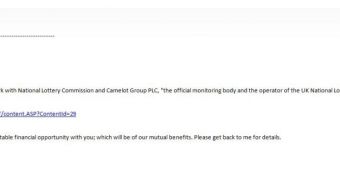Experts have found a new variant of the classic National Lottery Commission scam and, as it turns out, those who send them have put some effort into making them more legitimate-looking.
Microsoft researchers explain that Nigerian scammers create poorly conceived scams on purpose to filter out those who are too smart to fall for such plots, but it seems that even the most gullible users may be catching on to their schemes.
This is most likely the main reason for which many of the fake emails that land in inboxes have been considerably improved. On the other hand, they’re still far from being perfect.
According to HOTforSecurity, an email purporting to come from Mark Harris, the chief of the National Lottery Commission, is making the rounds again, but unlike the previously seen versions, this one has a couple of aces up its sleeve.
For instance, the email is still not worded properly, but at least it’s not as “Nigerian” as it used to be. Furthermore, the notification comes from an apparently legitimate email address and contains a link to a domain that actually bears the name of the Mr. Harris.
The domain is registered in 1995 and the website is under construction, but the fact that the sender’s email address is something like markharris@[something]harris.org could fool a large number of recipients into thinking that they’ve actually won the prize.
A link to the “company’s work profile” really points to the official website of the National Lottery Commission, where a message clearly reads:
Does the email/letter ask you to pay money to receive your prize, or to tell them personal information such as bank details or passport information?
If yes, then this is not from the National Lottery. The UK National Lottery would never ask you to pay an administration fee to collect your prize, or to disclose any personal information.
Another interesting aspect highlighted on the site is the fact that legitimate emails that come from the organization never actually contain the amount of the prize.

 14 DAY TRIAL //
14 DAY TRIAL //